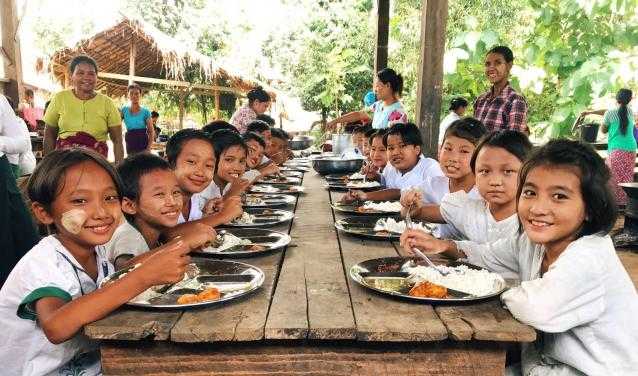Home>Witnessing the impact of education in Myanmar

30.11.2018
Witnessing the impact of education in Myanmar
Thiffanie Rodriguez, a Master’s student in International Public Management at Sciences Po is passionate about education. Before finishing the last semester of her Master’s, she took a gap year to explore discrepancies in education worldwide. After an internship at the Directorate of Education of the OECD (Organisation for Economic Co-operation and Development), she completed another internship over three months in the Myanmar Country Office of the World Food Programme. Read her account of the experience.
Can you tell us a bit more about the work you were engaged in for the World Food Programme in Myanmar?
I was lucky enough to have the opportunity to work with the School Feeding unit in Yangon. I completed an analytical study of a school meal programme piloted by the WFP in three regions of Myanmar. While WFP continues to distribute nutritional packs and expand its coverage into new areas, it is gradually shifting the main focus from snacks to full school meals. The objective of my analytical study was to assess the programme and increase its visibility for donors, at a time when provisions of food to schools are experiencing major budget reductions across the country.
I was given the freedom to design my research methodology, from questionnaires to the study’s structure. My supervisor and I conducted various field visits across the country, during which we interviewed groups of parents, teachers and students in order to identify best practices for distribution, as well as the possible limits of the programme. That meant I was able to observe first-hand the impact of WFP’s work for school children in the region: it was great to see a rise in attendance, performance, and community participation at all the targeted schools. I also had the opportunity of assisting in the organisation of a national workshop on school feeding, which brought together various education stakeholders to support them in strengthening their monitoring and evaluation functions.
How did you come across the internship?
After seeing the offer posted on the Sciences Po Careers page, I applied via the WFP website. I was invited to interview a month and a half before the start date of the internship, so from then it was a bit of a hurry to find accommodation and get all the necessary paperwork signed off! However, once I arrived in the country, the field office was extremely welcoming.
What will you take away from the experience?
I thoroughly enjoyed getting to act on behalf of a UN agency: observing the work of such a huge organisation at close range and then going into the field myself. It was clear to me that the UN has a positive impact on food security in the region and has become an effective safety net for vulnerable households. Although the work was difficult at times, since I was often given tasks to complete without supervision, I saw this as a valuable opportunity to run a project autonomously and develop my problem-solving and analytical skills.
Finally, I loved living in Myanmar: hanging out with my co-workers and spending long evenings discussing politics, international development, and cultural difference. Myanmar is a unique place to live, politically as well as socially. This will remain a life-changing experience for me and I would highly recommend the WFP as a workplace for any of my peers at Sciences Po.
Do you have any other projects in the pipeline?
My experience in Myanmar reinforced my desire to work in development policy, whether in education specifically or in other areas. As of next year, I will be starting an internship with the Early Grade Reading and Mathematics Project (RAMP) in Jordan. This should be another great opportunity to promote education, discover a new culture of work, and have a positive impact on one of the world’s communities.
Temple in Myanmar
This interview was originally published on the Sciences Po Careers website.
More articles like this

